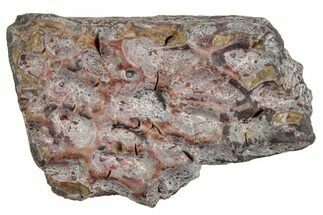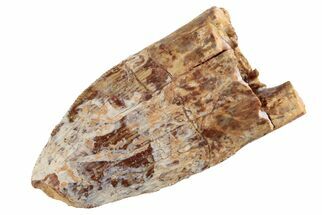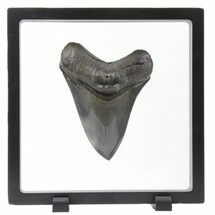This Specimen has been sold.
.7" Fossil Amphibian (Metoposaurus) Tooth - New Mexico
What we have for you is a .7" long tooth from a Triassic amphibian (Metoposaurus sp.). This tooth is from the Bull Canyon Member of the Triassic, Chinle Formation that extends from Arizona to Texas. This tooth is excellently preserved with minimal feeding wear on the tip. The tooth has spectacular enamel preservation, deep striations and is partially exposed from the sandstone in which it was found. This specimen comes with an acrylic stand for different display options.
Metoposaurids were the ginormous ancestors of modern amphibians that managed to survive the Permian-Triassic extinction. These salamander-like creatures approached, on average, five feet in length, though it is believed they may have grown up to nine feet long. These amphibians are characterized by their broad, flat skull, long limbs and paddle-like tail. Metoposaurs probably competed at the same feeding level with Phytosaurs, having very similar life styles and feeding strategies. Imagine a six foot salamander that behaves like a crocodile, and you have a mostly-accurate picture of Metoposaurids.
Metoposaurids were the ginormous ancestors of modern amphibians that managed to survive the Permian-Triassic extinction. These salamander-like creatures approached, on average, five feet in length, though it is believed they may have grown up to nine feet long. These amphibians are characterized by their broad, flat skull, long limbs and paddle-like tail. Metoposaurs probably competed at the same feeding level with Phytosaurs, having very similar life styles and feeding strategies. Imagine a six foot salamander that behaves like a crocodile, and you have a mostly-accurate picture of Metoposaurids.
SPECIES
Metoposaurus sp.
LOCATION
Quay County, New Mexico
FORMATION
Chinle Formation, Bull Canyon Member
SIZE
Tooth: .7", Rock 2.8 x 1.8"
CATEGORY
ITEM
#189120
We guarantee the authenticity of all of our specimens.
 Reviews
Reviews












